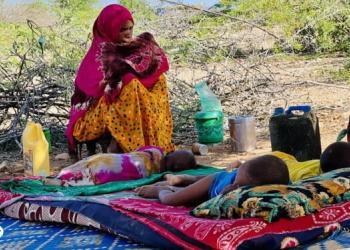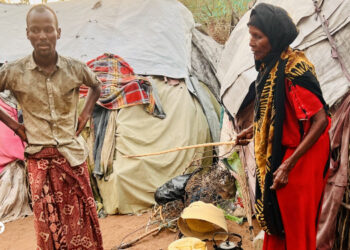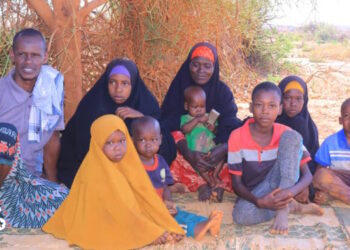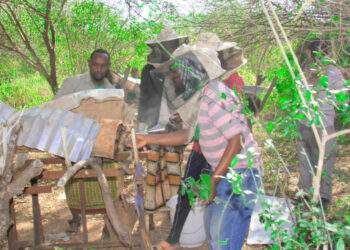(ERGO) – Before the streets of Baidoa fully awaken in the morning, 40-year-old Ibrahim Said Ahmed, a father of seven, sets off on his three-wheeler to deliver fresh vegetables and fruit — onions, chilies, bananas, tomatoes, and cabbages — to households across 10 neighbourhoods in the city.
For Ibrahim, this steady vegetable delivery business has transformed his family’s life. From being reliant on neighbours’ handouts, he now earns a daily profit of four to five dollars, enough to feed his family and pay rent for their modest home.
The business of home deliveries, especially in fresh produce among other products, has started to boom in Baidoa. It’s estimated that around 100 men, mostly displaced people and poor residents, are now involved in vegetable delivers for a living.
Ibrahim began this business in July, after years of hardship. His family were displaced from Awdiinle, 30 kilometres from Baidoa, when drought destroyed their three-hectare farm in 2022. They lived in Mubarak IDP camp until he decided to try something different, encouraged by friends who were doing similar work.
A relative lent him $150 to start the venture. He has since repaid half the loan. Renting ac tuk-tuk motorcycle costs him just one dollar a day.
“I used to be full of worry as we couldn’t cook three meals, I had no job, and no education for the kids, but now the change is visible. I’ve managed to save $100, things are much better than before,” he said.
He sent two of his children to school for the first time in October, paying about $10 a month in school fees. He has moved his family from a makeshift hut in the camp to a rented two-room iron-sheet house in Wadajir neighbourhood of the city, paying $20 monthly rent.
Another displaced father of five, Mohamed Isaaq Mohamed, also delivers vegetables door to door. He used to do odd jobs on construction sites.
“I had nowhere to work and nothing to do. I was living in a camp as a displaced person without hope. Now, I am a person who believes in God and in my work. Whatever my family needs, I can provide it. I had nothing before, but now I can pay my rent and provide three meals a day,” he told Radio Ergo’s local reporter.
Mohamed buys vegetables at low prices from farms outside the city and sells them in residential areas. He invested $200 in his business with help from relatives who believed in his idea.
He can now pay $15 monthly school fees for his three children, something he says brings him immense joy.
His family was displaced in 2019 from Goof-Gaduud-Buuray, about 30 kilometres from Baidoa, after drought wiped out their four-hectare farm. They had spent five difficult years in Idale camp, where finding work or food was a daily struggle.
“This job had lightened the burdens I used to carry,” he said. “We’re managing much better than before.”
He earns enough to cover household needs, reinvest in his business, and saves around $70 for emergencies such as healthcare.
The three-wheeler motorcycle he uses costs $45 a month to rent, an expense he can comfortably handle with his steady income.
The mobile delivery trade is still new in Baidoa, but has quickly gained popularity among customers who appreciate the convenience and lower prices. Many prefer buying from these men who come directly to their homes rather than spending time and money travelling to the market.
Sahra Salad Hassan, a regular customer, says she used to buy from the market but now enjoys home delivery.
“I see this home delivery of vegetables by the youth as great progress. I hope they don’t lose motivation and continue the good work they’ve started. For us, it’s a great opportunity, and for them too. I’m really happy to see them continue this work,” she told Radio Ergo.
She says the new service has helped her save about $60 a month in transport costs, as well as valuable time that she can now spend on other household and childcare duties.










